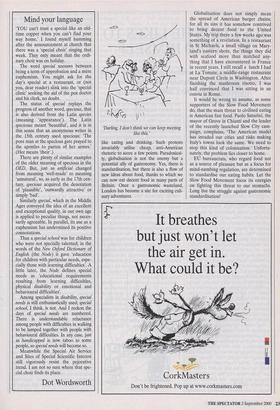Mind your language
`YOU can't trust a special like an old- time copper when you can't find your way home,' I found myself humming after the announcement at church that there was a 'special choir' singing that week. They only meant that the ordi- nary choir was on holiday.
The word special seesaws between being a term of approbation and a mere euphemism. You might ask for the day's special at a restaurant, or (not you, dear reader) slink into the 'special clinic' seeking the aid of the pox doctor and his clerk, no doubt.
The status of special replays the progress of another word, specious, that is also derived from the Latin species (meaning 'appearance'). The Latin speciosus meant 'beautiful', and it is in this sense that an anonymous writer in the 15th century used specious: The pore man at the specious gate prayed to the apostles to parten of her armes.' (Her means `their'.) There are plenty of similar examples of the older meaning of specious in the OED. But, just as artificial changed from meaning 'well-made' to meaning `unnatural', so, as early as the 17th cen- tury, specious acquired the denotation of 'plausible', 'outwardly attractive' or simply 'bad'.
Similarly special, which in the Middle Ages conveyed the idea of an excellent and exceptional quality, in our own age is applied to peculiar things, not neces- sarily agreeable. In parallel, its use as a euphemism has undermined its positive connotations.
Thus a special school was for children who were not specially talented; in the words of the New Oxford Dictionary of English (the Node) it gave 'education for children with particular needs, espe- cially those with learning difficulties'. A little later, the Node defines special needs as 'educational requirements resulting from learning difficulties, physical disability or emotional and behavioural difficulties'.
Among specialists in disability, special needs is still enthusiastically used; special school, I think, is not. And I reckon the days of special needs are numbered. There is understandable reluctance among people with difficulties in walking to be lumped together with people with behavioural difficulties. In any case, just as handicapped is now taboo to some people, so special needs will become so.
Meanwhile the Special Air Service and Sites of Special Scientific Interest still vigorously resist the pejorative trend. I am not so sure where that spe- cial choir finds its place.
Dot Wordsworth


























































 Previous page
Previous page